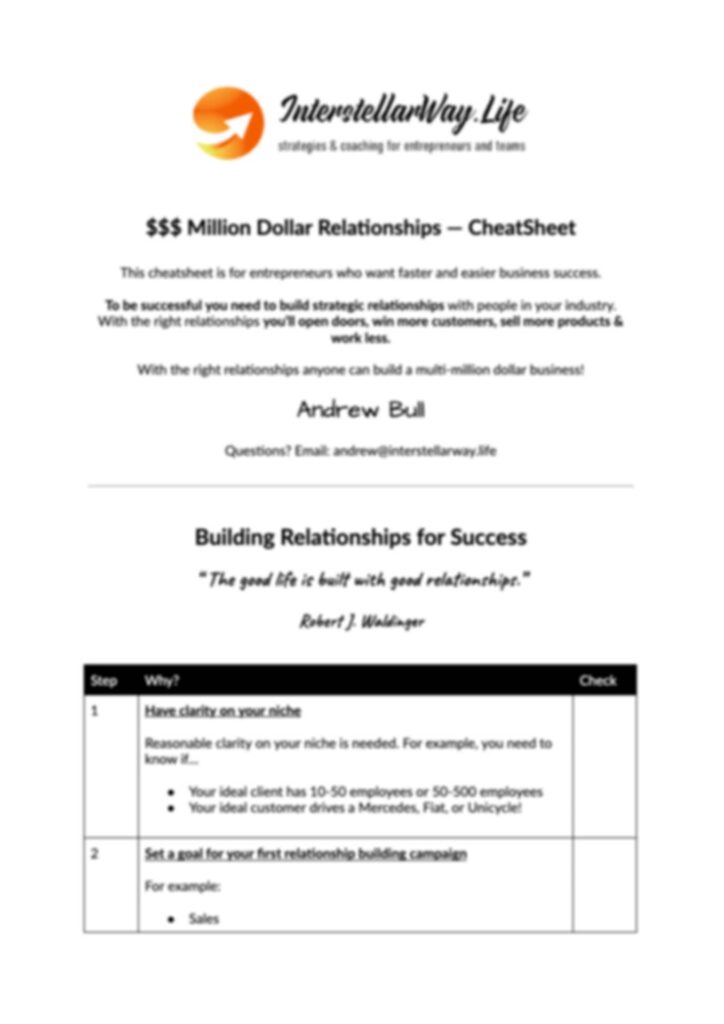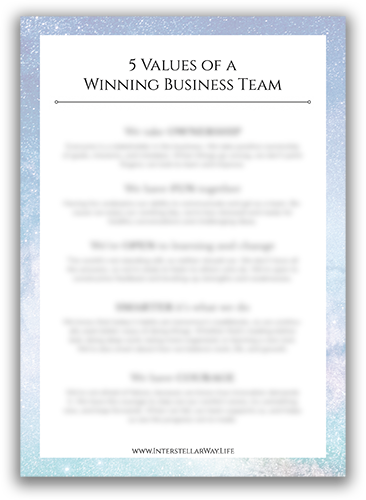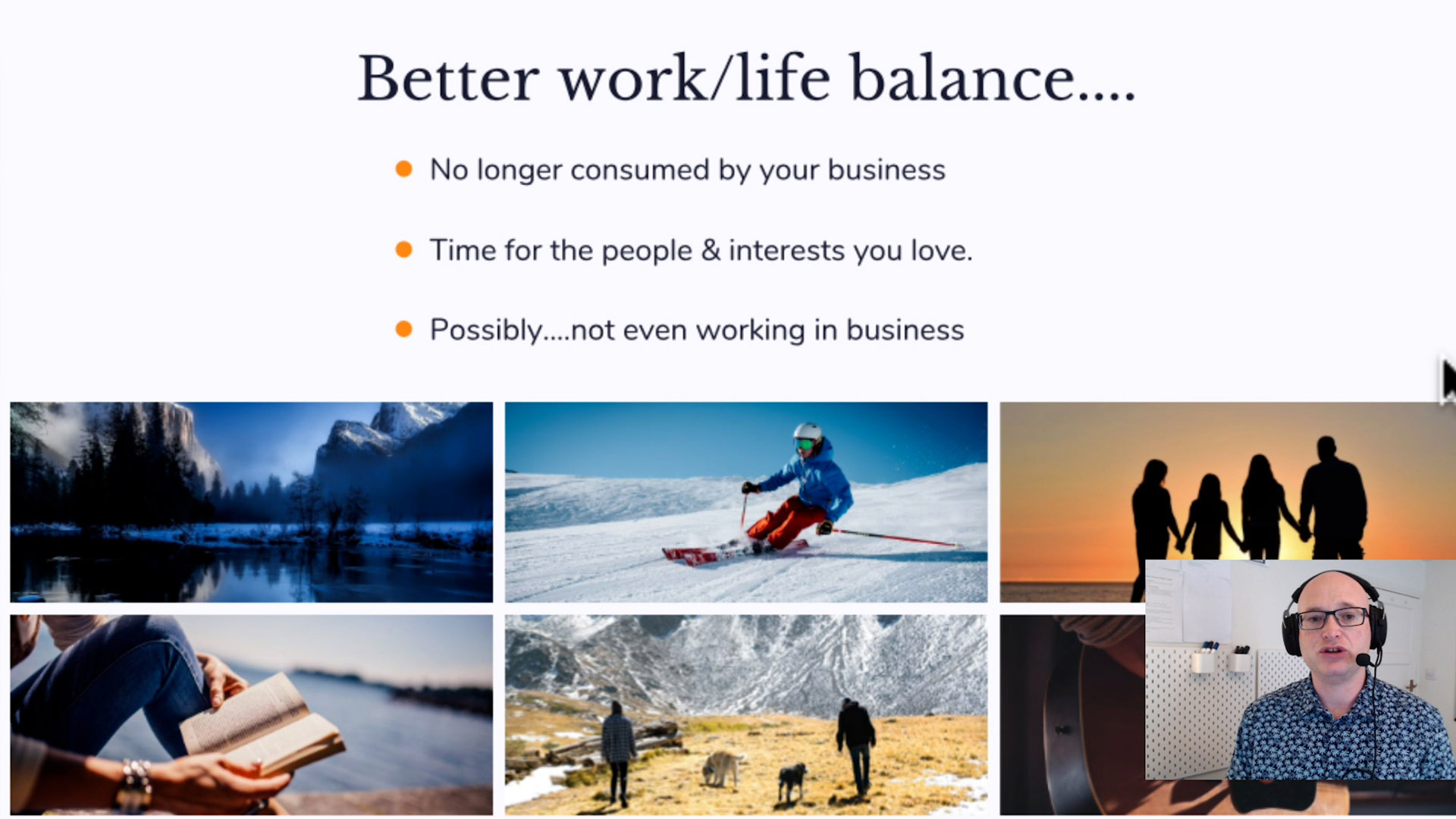Interstellar Business Show
Podcast for Technology CEOs and their teams.
It's time to grow your mind, elevate performance, and own your future 🚀

Interstellar Business Show
Episode: 0036
0036 - Mr Joe and Your Internal Board Of Directors
Featuring....
Episode Introduction
I’m going to ask you three important questions….
Do you ever wonder if you’re making the right decision? Do you ever fret and procrastinate about decisions? Do you ever jump feet first into big decisions without giving them adequate thought?
If you said “yes” to any of those things… then this episode is for you.
Today, I’m joined by an expert who’s going to help you make better decisions….
… by unlocking your internal board of directors.
Now, that might sound a bit weird and strange….
But don’t worry, all will become clear in the course of today’s show.
In today’s show you will learn:
- How to make better decisions
- How to tune in and tune out the right voices
- Plus, you’ll get actionable steps so you can start practicing what you learn today
I’m Andrew Bull, the author of Monsters of Team Performance. If you’re ready to improve your team’s performance… head to Amazon and pick up a copy of my book today.
Now, before we get started with today’s show and meet our guest, please make sure you subscribe and follow us wherever you’re listening today. So you never miss an episode again.
Episode notes & resources
Connect with Mr Joe:
www: mrjoe.uk
Joe is a trusted adviser and coach to CEOs of start-ups, high growth tech & Fortune / FTSE 100 companies.
A recovering neuroscientist, then a spell as an elementary school teacher, from UX research, to design, to product management then to product and business strategy. Joe brings 15 years in tech, $20b in revenue, experience with 30+ startups & FTSE / Fortune 100 gian
Love this podcast episode? Please leave a review here
Listen to more episodes here: Interstellar.Show
Get Andrew’s free Resources for Leaders with teams → https://bit.ly/2Ygyoij
Join Andrew’s Interstellar Community → https://interstellarway.life/sign-up-for-newsletter/
Transcript
Please note, this transcription is autogenerated, so there may be errors.
[00:00:00]
Andrew Bull: I’m going to ask you three important questions. Do you ever wonder if you’re making the right decision? Do you have a fret and procrastinate about decisions? Do you ever jump feet first into big decisions without giving them adequate thought? If you said yes to any of those questions. Then this episode is for you.
Today, I’m joined by an expert. Who’s going to help you make better decisions by unlocking your internal board of directors. Now, if that seems a bit weird and strange to you, that’s perfectly understandable, but don’t worry. All will become clear in the course of today’s show. In today’s show, you will learn how to make better decisions.
How to tune in and tune out the right and wrong voices. Plus you’ll get actionable steps so you can start practicing what you learn today. I’m Andrew Bull, the author of monsters of team performance. If you’re ready [00:01:00] to improve your team’s performance, head to Amazon today. And pick up a copy of my book. Now, before we get started with today’s show and meet our guest, please make sure you subscribe and follow us wherever you’re listening today. So you never miss an episode again.
Welcome to another episode of the inter Stella business show. Today, I’m here with Joe Leach, who is the coach to CEOs. Welcome to the show, Joe.
Joe Leech: Thank you very much. It’s actually, Mr. Joe, I should [00:02:00] correct you on that because I was, I was at one point I was a primary school teacher at one point and my kids couldn’t get the handle on my surname. So I was Mr. Joe to them. So I’ve kept the Mr. Joe part ever since. Really? So it’s Mr. Joe.
Andrew Bull: Okay, Mr. Joe Leach coach to CEOs. I like it. Very, very cool. Uh, and, and his website is Mr. joe.uk. There you go. We’ll get outta the way. Uh, can you share some achievements with us, says here your author of a book on psychology.
Joe Leech: That’s right? Yeah. I’m an north thro book on book on psychology. My background’s in neuroscience. Um, I have a master’s in human communication. Um, yeah, and really my career, I started my career in tech about 15, 16 years ago within a field called user experience, which is making technology a lot more user friendly.
And that really guided me to where I am now about making the people I work with a lot more user friendly. So
Andrew Bull: awesome. Let’s move forward into the first part of the show, which is called [00:03:00]
So in this part of the show, our guest shares a secret or story that people don’t know about them. Joe, what’s your secret?
Joe Leech: my secret, my story is I once had a sauna with meatloaf. Now I know that’s completely UN related, but I was once, Living in bath. And I, uh, was going for a sauna after school, in the local local municipal pool, which had a steam room, went into the steam room on a Friday evening after work. There was a big guy there, this hair there, thank hair, hanging down and used to have gigs concerts at the rugby ground next to the, to the pool.
And I was sat there. I was looking to this guy and I sort of, you know, I always had a nice chatting there and saw, and I was sort of saying, hello, how are you? And he is an American guy and I chat. And I said, so what do you do? What is it you do? And he said, “Dude, I’m Meatloaf” and I couldn’t really follow that up.
So I once had a Soer with meatloaf. Oh, it’s my claim to fame.
Andrew Bull: I suppose he was one of those guys that you kind of didn. Automatically recognize when he [00:04:00] wasn’t dress dressed up in the full meatloaf of hell mode. So I can quite understand like
Joe Leech: absolutely not just a, a guy with, you know, a bit, a big guy with long hair in the corner of the sauna. It was very steamy. So you couldn’t quite see it was, but yeah, it turned out as.
Andrew Bull: All right. So let’s talk about your origin story then. How did you become Mr. Joe Leach coach to CEOs? What happened?
Joe Leech: So, as I mentioned earlier on I, I studied user experience. So that’s the idea of making technology more user friendly. And I enjoyed doing that. I did that for many years. I worked for people like eBay on some very early designs and work on their shopping cart. I helped designed and re launched the train line in 2010, which is the UK train ticket. I then moved to money supermarket and helped them relaunch their savings and loans and mortgages channels, um, in terms of understanding and making those much more user friendly. And then following that, I started working with Marrit and helped me to kind of redesign and relaunch in 2014, which was across sort of [00:05:00] effectively a global relaunch, multiple languages, multiple countries.
And what was interesting about my career up to that point is I’d always kind of been a doer. I’d been a designer and researcher, but I was getting very frustrated that the folks at the top didn’t seem to be making the best decisions and choices. And I didn’t understand why in it. I found that frustrating and I figured, well, the only way for me to really find that out was to start working with those people to truly understand what it was that helped them make good or bad decisions.
And so over the course. I guess from about 2015 to where we are now, the last seven years, that’s really where I’ve moved to. As I’ve moved up and started working with folks in the C-suite to help them make better decisions and choices. When it comes to originally, it was tech strategy and that kind of stuff, but more recently it’s become business strategy and more recently it’s actually even become a personal with their personal lives and how they can sort of live to be the person they’ve always wanted to.
Andrew Bull: Okay, fantastic. Right. Let’s move on with has, and speed to our next segment of the show, which is called
[00:06:00] can you tell us about this big idea that you want to share with our tech CEOs who listen today? What do they need to know? Joe?
Joe Leech: Yeah, sure. So many of the CEOs that I work with, one of the things that they hate having to do most is managing their board of directors. They hate preparing for it. They hate. Scrutiny. They hate the criticism that could often come from those groups of people. And that was always of interest to me. Cause the board of directors always be there to support that individual.
And what was interesting, the more I started working with people and with CEOs directly and digging into my kind of background in psychology, I realized that actually what’s interesting is that we all have an internal board of directors at the same time. So we have people who sit on our internal board of directors and they whisper an, our it’s about what we should, or we shouldn’t be doing.
So a good example of, one of mine is I’ve got kind of a background in public speaking. And one of the, my internal board of directors is my imposter syndrome. I call it imp to give it a name and a [00:07:00] face, and imp tells me constantly before I get on stage. What are you doing? You shouldn’t be here. This isn’t, this isn’t, you don’t belong here.
This, you aren’t good enough to be doing this sort of stuff. And imp I always worried was the thing that was holding me back. But what was interesting about my imposter syndrome and imp especially was actually when I started listening and talking to him, imp was telling me that. I could be better doing better, that I should be doing more preparation.
That actually it made me a better public speaker than if I didn’t have him there so much. So that one speaking gig I had was some very, very seasoned professional public speakers. I was maybe the only amateur on the panel and I didn’t get nervous and I, the imposter syndrome wasn’t there. Right. I squashed it away.
And do you know what on stage I was dreadful? I didn’t have that little voice in my ear telling me to prepare to be a little bit nervous to have that adrenaline in rush before you get on stage and actually. Imposter syndrome was my superpower. It was a kind of feature and not a bug. Um, and so the big idea that I talk to my CEOs about is this idea that you’ve got multiple voices, multiple people on your internal board directors that are [00:08:00] telling you certain different things.
Maybe they’re things like imposter syndrome, maybe they are, um, other anxieties or worries. Maybe they’re things that telling you to be bigger and larger than you should be, but they’re all important in terms of deciding and helping you make the choices that you make.
Andrew Bull: Do you think part of this is to do with balance and about, you know, if our regular board of directors is just. Full of really adventurous. Like, let’s go do this kind of thing all the time. Just like overly positive people, which is good to have some of those people. But if that’s our entire board of directors is like that and we don’t have any, maybe more pessimistic, cynical, grounded, realistic, however you wanna call it.
We don’t have those people on the board. We can end up without making balanced decisions and getting a broad perspective on things. So it’s the same applying here with our internal board of directors.
Joe Leech: Yeah, completely. Right. And you know, that temptation is, is that you need that balance in there. And a lot of the tech CEOs that I work with are often founders, and they’ve been on the founder journey from a [00:09:00] startup and to raise any venture capital, you’ve gotta have thick skin and really believe what you say.
You know, you’ve really got to turn all of your, your visions up to 11, you know, to really. Be strong and believe in your own vision. And again, that’s great. Cause that can get you to a certain point is being that headstrong, visionary leader. But at the same time, you need that. As you said, balance to help you understand, well, how we gonna do that?
Where are gonna be the trials and tribulations? What are we gonna challenges ahead of you? If you’re constantly talking and pushing forward with the vision, you’re never really, truly appreciated how in essence you are gonna get there. What are. Challenges and problems you’re gonna face on the way. And so what your internal board of directors can help you do is to give you a balanced view of what you should be thinking and feeling at at one point.
Andrew Bull: Can you share any stories of how you’ve helped any actual directors, uh, overcome, being too far in one direction or another. I understand you can’t name names, but maybe you could share an anecdote or two.
Joe Leech: Yeah. Well, I can talk about the situation we’re in at the moment, actually, with this potentially looming [00:10:00] recession on the horizon is that a lot of CEOs are worried now, you know, not surprisingly, a lot of us are worried. Prospective a recession. And that can be really interesting. Cause there could be then the PO the voice of, of fear and anxiety there.
And what’s interesting about high achievers is they, they, they hate uncertainty. They want to be controlled. There’s a control freak in there in terms of them. So anybody who’s ambitious also wants full control over everything that’s going on. And so part of being in the recession or entering into a recession is you can.
You’ve got to give up that element of control. You can’t control if the world goes into a recession or not. So we’re living in uncertain times and that can be quite scary for most people. And that’s where a lot of anxiety can come from when you’re at the top is just of knowing this, that you can’t control the global situation that you’re in.
And so in those sorts of situations like, well, the recession’s coming, cause you’ve got these multiple voices in your head. One of them, which is your controller saying. We’ve gotta get control of this. We’ve gotta control the situation from that one in. We need control. Now we need control. And the reality is, of course you can’t do that.
Then you have other elements in there. You have [00:11:00] the, the fear, which is, well, maybe we need to cut 20% of staff to get more runway, to get, you know, to cut cash flow. And so you start to operate from a place of fear because you, again, you can’t control that, that uncertainty that’s out there. And you think the first thing that you absolutely should do is just to cut the number of staff on.
On the books to give yourself more runway, more cash flow, whatever that might be. And the reality is, is that’s the kind of kneejerk reaction to where you are now that this lack of control you may be facing or feeling and the ability and feeling that you want to get control back. Is a way of dealing with that, but there’s also a way of dealing that, which is again, where I work with.
A lot of my CEOs is, well, how can you live in a place of being comfortable with uncertainty, understanding there’s a voice telling you that you need to be controlling this place, but how do you feel and work comfortably in a world of uncertainty, which again, if you’re a smaller or medium sized company, There isn’t as much uncertainty as if there is perhaps if you’re a, you know, a Foote 100, um, fortune 500 company, there’s a lot more uncertainty out there for you in the future.
So being able to live with that uncertainty is really what [00:12:00] is the mark of a great leader?
Andrew Bull: Mm. Yeah. I mean, I look at the current time we’re in right now, this post COVID time as what I call the brave new world, because it seems like since COVID changes, constant, very unpredictable, very rapid. One minute, petrol prizes are tanking that mix minute they’re through the roof. And then if a recession hits, they’ll probably drop again, right.
Because no one will be doing anything. You know, that’s just one aspect of what’s happening right now, which affects so many businesses. So we do have to be much more resilient, uh, and learn to deal with this change that we’re in. And, and it’s probably here to stay to some respect, because even if things like, even if things like Ukraine resolve in the next couple of years, we’re then going to be dealing with global warming and all of those huge challenges, which are going to start having [00:13:00] an effect in the next 10, 20 years or so a noticeable effect. So we have gotta become more resilient. So I think it’s great that you are doing that.
Joe Leech: It’s that uncertainty, which can actually living in an uncertain times can actually be one of your superpowers. So again, as where we might think that that’s, that’s a bad situation to be in is, you know, wanting control, actually the leaders that thrive in uncertain times, although the leaders that come out much stronger is that, you know, that some of the best businesses have been built during recession and during difficult times.
And so. Embracing that uncertainty and living with that uncertainty can actually differentiate you and give you an age that most of the, most of your competition won’t be doing, they’ll be looking to. Cut jobs, cut costs. Do that kind of stuff is if you are operating and playing a different game during a recession, that gives you an edge that they simply won’t have.
And all it really is, is understanding. What’s that inner voice telling you that inner voice is telling you to be scared. Then you’re operating from a place of fear and nobody wants to make choices and decisions from a place of fear, because that’s an emotional reaction to what’s going on, not a [00:14:00] strategic choice.
And so we’re listening to these voices and understanding what they’re saying to you. And it, it’s fine to be scared. It’s fine to be anxious. Everybody feels that it’s about listening to that voice, understanding what it’s saying to you, deciding if you want to listen to it and to take that advice, the same’s true of the imposter, the same’s true of any hubris, the things in terms of the overconfident leader, all of these voices, you just have to listen to and understand why it’s telling you what it’s telling you.
And if you want to make the choice to do that particular. Um, what’s interesting about the internal board of directors model as well, is that actually what’s what’s happening is there’s an internal conflict. There is you might have two voices telling you two different things. Oh, we should be scared. We should be cutting costs now.
Cause it’s the middle of. Of a recession versus the visionary. That’s saying, well, we know on our business plan, we need to be in this place in two years time, you’ve gotta be, keep pushing forward. You’ve got these two voices telling you two conflicting things and to be having that in your head all the times, this can be number one, exhausting, but also again, make it harder for you to make a decision.
So a lot of what I work on my with my CEOs is it’s just listening to the voices, understanding [00:15:00] why it’s telling you what it’s telling you, and then making a choice based on what those voices are telling you at any one.
Andrew Bull: So, I guess one of the things that CEOs need to develop then is awareness self-awareness of these voices inside their heads, and perhaps being aware that maybe sometimes they’re on autopilot, just listening to the strongest voice in their head. Would that be a correct thing to say?
Joe Leech: Well, I mean, definitely. So. What’s interesting about this theory that I’m talking about here, the internal board of directors, it comes from a psychological theory called internal family systems. And it’s all about really these, these, these boards of directors are built during a period of our life. And what can be interesting about a board of directors that’s driving you internally.
There may be one, that’s been your superpower throughout the one that’s driven you to be the career success that you’re in. So let’s take an example of like a, an executive in a company. Their superpower has always been that they are the most [00:16:00] knowledgeable person in the company, by everything that’s going on, be that the product, the way the company works or whatever, that’s their superpower.
That’s driven them all the way through their career, right up to perhaps direct to level within an organization, you know, VP level, whatever, within an organization they’ve, they’ve been across everything. And everybody knows that they have the answers to exactly what’s going on and that’s been their superpower for a long time in that business. You can quite clearly see that, that superpower’s only gonna get to a certain point in the business to be able to grow your career any, any further than that place. You’ve got to, you’ve got to kind of give up that level of control and bring across everything because you can’t maintain that when you’ve got huge numbers of people working for your you’re in a very, very busy, large business, the same true of a startup founder.
Again, early on they’re across everything. When the business grows to maybe 20, 30, 40 people, they can’t be across anything, everything anymore. That’s super power that that director that’s got them to that point is not gonna be the director that carries them forward through the rest of their career.
You’ve got to be the person that trusts and delegates work to other people. And that’s a different set of [00:17:00] skills to being able to be across everything yourself. So you’ve got to let that director take a backseat. I mean, it’s useful to have it in certain situations, but you can’t listen to that director all of the time.
You’ve gotta let other directors take over. That self awareness of what has got you to the point you, you are at now within your career or within your startup life is not the same thing that’s gonna carry you forward. And that self-awareness of that is really the first step in understanding who else sits on your board of directors.
What other skills and what are the ways of working? Can you bring to the fore to help drive you through the next period of your career or your business growth? And that’s almost certainly something that. Innate and within you, you’ve just got to uncover what is that director and how they can help you push forward?
Cause typically there’s been one director that’s driven you to where you are now and actually to be the great leader you want to be. You’ve got to have a balanced view for maybe 10, 15 different directors to help you get to the place that you need to be next.
Andrew Bull: And talking about next [00:18:00] moves. You mentioned before the show that there’s actually quite a high turnover of CEOs, 17%. So is this a reason then that CEOs actually might want to pay attention to this idea of this board of directors?
Joe Leech: definitely. Because again, first time C CEO is the biggest thing they have to realize is exactly what I just did then that got them to that point of being a CEO right there, and then is not gonna what what’s gonna make them a successful CEO. There was probably a specialism of some kind be that. chief financial officer, maybe it’s marketing, maybe it’s sales.
There was a specialty that got them to the place to where they are. Now that specialty cannot lead you into the next period of your career. Many CEOs fail because again, they failed to really, they have to effectively reinvent themselves when they get that job as a CEO and realize and understand what is it that needs to be done for the job rather than the special skills perhaps that they bring to the table.
What does the company need? What does the senior leadership team need? [00:19:00] What is it that I bring effectively? What you can end up seeing is that CEOs who get the job have, have had all the right answers up to that point in that career, they know exactly what they’ve had to do. They have all the answers.
They’ve been the experts. They’ve been the smartest person in the room to take that next leap. They have to have all the right questions and to embrace things like curiosity and. By embracing curiosity, which is again, very, a natural way to think about things. Again, if you’re asking what seemingly not silly questions, but questions generally that can be seen to ode in your power slightly that you’re not the expert.
If you’re asking questions all the time. And so it’s, again, it’s about a reinvention of, of almost who you are over that first 18 months of a CEO that really sets you apart from the CEOs that never do that, that maybe. They carry on the way that they’ve always done with their, that existing board of directors, sending them to be the expert or do the things the way they’ve always done them.
And that gets ’em to a certain point, but it’ll never get ’em to the point where they absolutely, they need to be. And the business needs to be to really drive growth going forward. It’s about letting go the past and embracing what you could be in the future [00:20:00] really sets apart CEOs that succeed.
Andrew Bull: And it, it does make me really think about that whole idea of CEOs who start out not developing, uh, themselves with soft skills and awareness. But like you say, just being very skilled in an area. And they get to a certain point in their career.
And actually there’s a choice at that point of whether you kind of really want to mature as a person or not, and kind of face your inner demons in a way, not necessarily they’re not necessarily demons or, or negative things, but whether you really want to look into yourself and like really open yourself up to growth.
And it seems like that’s what you’re saying needs to happen. If people are going to go to the next level of in performance and maybe contentment in life as well.
Joe Leech: I mean, absolutely. It’s it’s the next step, really? Because. If you look at the way business has been traditionally taught, many of us have grown up in a business environment that doesn’t emphasize soft skills. It’s all about knowing [00:21:00] what to do when to do it, and being able to steamroll our things through really that’s where we’ve come from.
It’s kind of come from a, you know, if you look at modern business, really, it was forged after the second world war, the commander control structures that came home with soldiers. And we’ve not really ever given that up much things like the pandemic and lockdown have really shifted how our workforce are these days.
They’re not, you can’t expect to be walking the halls of your organization, checking, everybody’s doing a great job. You can’t do that anymore. Lockdown absolutely. Was the last thing that, you know, that. Was the thing that stopped that happening. You’ve got to trust and empower your team to do good work and that isn’t standing behind them telling one what to do.
It’s about asking them the right questions and giving them the support that they need to do a good job. A study was published fairly recently from Axios about. , what skills are being emphasized in CEO, job listings these days. And it’s, there’s something like a 28% rise in social skills are being requested within CEO job, job specs.
And what’s interesting is the converse of that is that there’s been almost a 40% drop in, [00:22:00] in skills, such as management of material, financial skills, all of those kinds of things that seems being the secret weapon, managing resources and numbers. Previously in business, those sort of skills are being less emphasized now.
And, and social skills are being seen as really what’s driving businesses forward. And you can see that in terms of the fact that certainly within the UK and the us, there’s a real skill shortage. So most CEOs trying to recruit in key senior roles, especially in tech, can’t find the people that they want.
And you can’t expect to. In very difficult conditions. If you’re treating people like a resource, you’ve got to treat them like a human being. And so these soft skills are strategic in their absolute nature, because for you to understand truly what makes your team and your employees tick means that you’re gonna get better results from your team and your employees you’ll see sweet from anybody that’s around you.
If you’ve got the soft skills to drive those people forward, if you are using the proverbial stick versus the carrot, you’re never gonna get [00:23:00] people past a certain level and people in this job environment where. People can walk out of a job today and probably get a higher paid job tomorrow. Very easily.
You can’t, you’ve got to start to learn how to really treat people as humans, because that’s exactly how humans want to be treated. No surprise that at all. You can’t treat them like a resource anymore.
Andrew Bull: Yeah. People don’t want to be thought of as like a stack of micro chips or lumps of coal or something that can be shoved into the stationary cupboard, uh, when they’re of no use. So yeah, we really do have to change our mindset around how we treat people in a business and talent. Magnetism is so important.
You’re right. It’s becoming more and more
important. So how can CEOs take action with this idea? If a CEO is listening right now and they want to take some easy first steps with starting to get their board of directors into line, what can they do, Joe?
Joe Leech: Well, the first thing, the most obvious thing is just to sort of stop and listen. So in any situation you’re having to make a decision or a choice [00:24:00] it’s just to listen and think, well, who’s talking here. Try to identify which maybe which board member of your board of directors is, is speaking. Try to identify some of them.
Are there. What are you feeling at this moment? You feeling anxious, you feeling scared, you feeling empowered, you feeling happy. How are you feeling and try to in sort of interrogate and think of yourself about. Who is almost driving the bus at this point when you’re making a choice. And really that awareness of this happening is the first step is to spend maybe a week just having to think about that in any situation, really, you know, maybe you’re having a one to one with a member of your team.
Maybe you are preparing for the board meeting who knows what it might be that you are actually doing, but understanding and listening to who might be talking inside of you and just making a note of who they might be and start putting together a list of some of. These internal boards of directors. And that’s really the first step is just understanding who they are because by understanding who they are, you know, really then what, why and what they’re gonna tell you, they’re gonna tell you what they’re gonna tell you.
So really it’s just awareness and listening to start with and [00:25:00] making a note of, of all of these members of your board of directors that can just help you understand who they are.
Andrew Bull: All right. So if we’re gonna play around and have a little bit of fun with this idea, then so shall I move some people into the basement, some of my directors into the basement and not let them see the light of day again, put some in the penthouse.
Joe Leech: I mean that. That’s the dangerous aspect to it. So if you think, if you’re at your external board of directors, right, you haven’t got any real control over who sits on your, maybe you have, but you know, British companies, you’ve got the chairman who often chooses the board of directors on your behalf, or maybe its investors are being put on your board of directors.
You don’t necessarily have the choice about who sits on your board of directors, both internally and externally. And. If you were to take your external board directors, if, if one of your directors were telling you something and you were just trying to ignore them and ask them to step out of the room and not, not listen to them and say, no, no, I’m not gonna listen to you.
I’m gonna put you to one side. We’re not gonna do that. How’s that individual gonna react? They’re gonna react. They’re gonna start shouting even louder. They’re not gonna not want to be heard because again, that’s their job as a director is to [00:26:00] be heard and to help influence the company and the same’s true of your internal board directors.
If you try and squash these voices down, stop listening to them. They come back to you and often they come back to you at the worst possible moments, like three o’clock in the morning, or, um, in certain situations like a good example would be where this has kind of gone wrong for. An individual was will Smith at the Oscars this year where, you know, we all saw him stand up and stone gap on stage and slap.
I can’t really was. He slapped on the stage for making a comment about his wife. That is a. Board in a board of director, a person there is helping him to survive. There’s clearly somebody, a board member of his board who is a, is a tough guy, you know, who reacts with violence in certain situations to help him survive.
And that maybe was great. In his younger times, maybe he got bullied and that helped him survive a bullying experience when he was a kid. But that’s not the board of director you want on Oscar night talking on your behalf. And the same’s true of any CEO. Now, if you squash and sit on a member of your board, they’re just gonna shout louder and they’re gonna come out when you don’t want them to come.[00:27:00]
In a situation where you might get angry and, you know, as a co you don’t ever want to get angry. You might feel anger, but you don’t ever want to be angry. And so you’ve really got to just listen to these boards of directors, understanding why they’re telling you what they’re telling you, where that member of the board, why you appointed in the first place.
Maybe it’s something that happened to you 15, 20, 30 years ago, but it’s understanding where that member of the board’s come from can help you understand why they’re telling you to do what they’re telling you to do. And if you want to do it or not, the worst thing you can do is just ignore it.
Andrew Bull: Okay. And how do you help people take action then with their board of directors?
Joe Leech: We really simply just go through that exercise and. We, we start to list out who these members of the board are. And then we start to have an understanding about what superpower they bring, why they are on your board, what are they, that’s your, the strength that they bring to you as a leader.
And then equally alongside that, we look at the weaknesses that that member of the board has. And then in certain situations, we take the members of your board, the strengths and weaknesses, and we decide. Again, I use another idea of, of like a, a football game. Who do you, [00:28:00] who do you wanna put on the pitch?
Who do you wanna put on the, the field at any one time in a particular situation? So you’ve got maybe a choice of 15 different players that you can choose, which of those 15 players are you gonna put on the board at any one time? So you can start to see where this may initially you may think this is a weakness that you have these members of the board.
The actually the reality is to date your strength. As you can decide, which one of these players you want to play in a certain situation. And lean into that, or simply not play any of them at all and be your true inner self. That in itself can be all of those things that you want it to be. They call that the eight CS within the theory.
So you can be calm, compassionate, curious. You can have clarity, courage, all of those things that we, we strive to want and are often listed as leadership skills. They come when you park each member of the board directors and you just act from yourself with internally. So it can really be an actual strategy for self for.
Really driving you forward, giving you superpowers is by understanding who is on your board when you listen to them. And when you don’t.
Andrew Bull: Awesome. Thanks for sharing that, Joe, there’s [00:29:00] some, uh, wonderful insights there.
Right. Let’s move forward into our last segment of the show,
So what’s the big result Joe, that tech leaders can get. If they action, your big idea.
Joe Leech: They go from being one individual, who’s got maybe one set of skills or a series of sets of skills to being a team. You become a team of people. Again, you’re in a board of directors that are useful in certain situations for certain tasks, for certain individuals in certain ways, as you start to become much more of a multiple series of different people that are appropriate for different elements of the business that you’re working on, it’s become very different.
When you’re working with your board of directors, as you are working with a, your C- suite, as you’re working with a junior member of staff, who’s. Got their first day of the business, working with your family, working with your kids, you can then decide who you’re going to be in that situation, who you want to be in that situation and lean into the very fat that you’ve got this internal board of directors on your side.
Andrew Bull: And if people want your [00:30:00] help, where can they go to get that big?
Joe Leech: So the place to go is to just come to my website and Mr. joe.uk, Mr. J OE dot. I love to have conversations with people. So drop me a line. We can have a conversation. I rare well in, I never charge for that first conversation that first 90 minute coaching session. So if you are facing challenges with the recession, if something, what I’ve said to you today is, has resonated with you.
I’m gonna, I’m happy to give listings of the show. I’m gonna hold two coaching slots available for them. So if they wanna get in touch, we’re happily offer them a complimentary coaching session based on, listening to me here on the, on the show today.
Andrew Bull: Thank you. That’s very generous of you. Well, thanks for being a great guest today, Joe really enjoyed talking with you.
Joe Leech: No problem. Thank you.
Andrew Bull: My thanks to Mr. Joe for sharing his expertise with us today. I certainly learned a lot.
My big [00:31:00] takeaway from our conversation is that we all have an internal board of directors. Those different voices and opinions in our head. And we’ve some careful thought we can begin to both except and regulate these different voices. And doing so will help us make better decisions.
Moving forward. I’m certainly going to be more conscious of my internal board of directors. And I’d advise you to do the same.
Before I wrap up, I want to share a little bit about my new book, monsters of team performance. It’s a book that will help you improve the performance of your team. You can grab a copy at Amazon today.
Now if you haven’t already done so hit that subscribe or follow button wherever you’re listening today. And all I’ve got left to say is thanks for being here. Have courage own your future. Take action.








